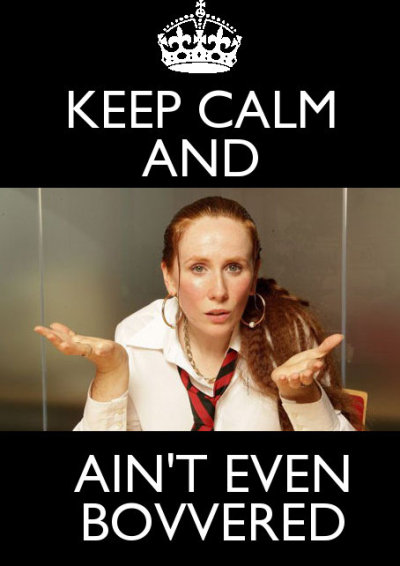 |
| via Into the TARDIS |
Hanna @ ... fly over me, evil angel ... composed a two-parter on the three episodes that comprise season one of the new Sherlock: "Catch you ..." and "... later." Pay particular attention to the awesome point she makes in the second half about the character of Holmes and the elusiveness of his emotional life.
What I think is interesting in the new Sherlock is how detached Sherlock has become. The Brett Holmes was distanced, uninvolved -- but never unemotional. He had a sense of humor (albeit occasionally a peculiar one), a great deal of pride in his skill and accomplishments, a keen sense of class distinction, an ear for music, and rather snobby tastes in food and wine if I remember rightly. My point here in assembling this rather mongrel list is that Holmes never came across in the original Doyle stories as suffering from any kind of psychiatric condition: yeah, he was a bit weird, but it's mostly the kind of weird you can write off as being genuine Victorian gentleman weirdness. (This is the same kind of weirdness that comes across with the father of the family in Doctor Who's "Tooth and Claw" episode, written off by the Doctor with, "I just thought you were happy!")
This Sherlock is a little bit beyond that -- this is sort of like what would happen if you took Conan Doyle's Sherlock, crossed him with Cracker, and then added some of the late Prime Suspect Jane Tennison. He is not only distant, he is actually removed. We don't know why -- I would imagine speculation runs rife in fandom -- but there are, presumably, reasons.
Tasha @ Natasha Curson - a trans history) has two pieces up that I like, one on the language we use to talk about trans issues, and one on body modification surgery. From the first post:
Ultimately, we all want to be ourselves and to be able, as far as possible, to express ourselves freely. For trans people getting to that point can be a very difficult journey. I’m still on my journey, and it took me decades just to get on the right road. Many people struggle, or don’t make it at all. So where does this leave us when it comes to labels/names/words? I think labels can empower when we use them ourselves, or when others use them about us respectfully and affirmatively. If they are used in order to limit the ambition of others, or to direct hate towards them, the effect can be incredibly powerful.Also on the subject of personal experience and the naming thereof, Minerva @ Hypomnemata offers some thoughts on emotional and physical intimacy in a post In Which the Gloves Come Decidedly OFF!
In a way, my asexuality has only made this habit more clear. I spend so much of my time saying what I won’t do, that I’ve lost sight of figuring out what I will do or what I do want. It’s rather ridiculous actually, since I make it a habit of telling people not to do what I’m doing, namely self-limiting. I’m not sure how accurate my perceptions are, but I feel like this is a trend that’s not under-represented within the asexual community. I see a lot of blog posts about the ways in which we are different from sexuals, the ways we won’t engage in intimacy, but I haven’t heard much about the ways in which we will. Where are the discussions about our expressions of intimacy, the concrete nitty-gritty of what asexual relationship intimacy looks (would look) like, and not just in a theoretical fashion?Diana @ The Waki Librarian has good thoughts to share on the relationship between academic discourse and professional conversations. While she's talking specifically about the library-and-archives field, I'd say the same balancing act can be found around any area of interest: what is the relationship, in the end, between theory and practice, and how do we -- as individuals and as colleagues in a given field -- understand, articulate, and utilize that relationship?
For me, yes, there are differences between academic discourse and professional discourse that occurs via social media, but that doesn’t mean that there can’t and shouldn’t be overlap between the two discourses. I’m an academic and do quite a bit of research and writing in the formal, traditional academic model. It’s a very important discourse. Research is important for producing the kind of quality evidence available to use as a basis for decision-making and to further develop theory and models in our field. It is important to be able to write your results up in an article in such a way that it withstands peer-review and can be used as a credible source. No one, I think, would deny that. But it doesn’t do one lick of good just sitting in an article that few people will ever read–especially in our field which is an applied, practical, professional field. Keeping an academic discourse cloistered is silly and inhibits good ideas from spreading. I adore the intellectual stimulation of academia (and the excuse to do research), but I really don’t enjoy the concept (and practice) of academia as a world and conversation set apart from every other conversation happening in our field.And my friend Lola @ Oh, My Sainted Aunt (her recently-launched tumblr blog), offers this gem of people-on-the-street observations
Overheard at the Museum:Hope you're having a lovely weekend ... I don't know about you, but I'm psyched for a nice long Thanksgiving holiday. Hanna and I are taking Tuesday afternoon through Sunday off from work, and plan to enjoy every damn minute of it.
Visitor [looking at photographs from 1918 influenza pandemic]: “I didn’t know they had an influenza epidemic in the 1600s.”
Well, I didn’t know they had photography either. Everyone learned something new today
No comments:
Post a Comment